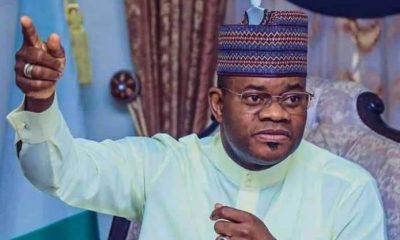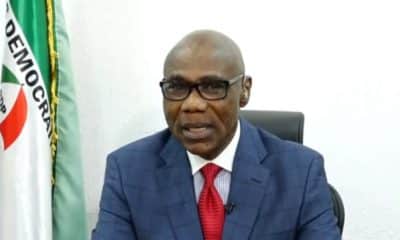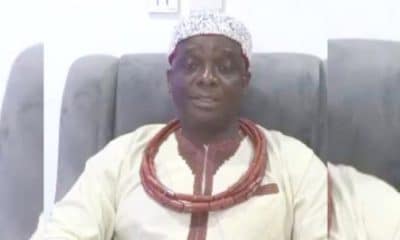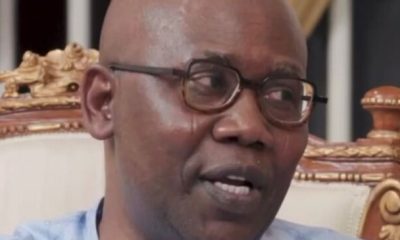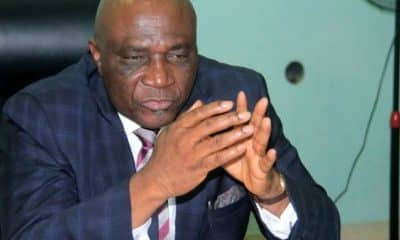Nigeria News
Boko Haram Founder’s Son And Notorious ISWAP Leader Al-Barnawi Killed

The vicious leader of the Islamic State West Africa Province (ISWAP), Abu Musab Al-Barnawi has been reportedly killed in Borno State.
It was gathered from multiple sources that the dreaded ISWAP leader was killed in the last week of August, this year.
How Al-Barnawi was killed
According to DailyTrust, there are two version on how the notorious terrorists was killed.
One version claimed he was killed by Nigerian soldiers while the second version claimed that his death was due to internal rivalry in ISWAP.
A source revealed that the ISWAP leader was killed during an ambush by troops which also claimed the lives of four or five top ISWAP leaders and many foot terrorists loyal to him.
The source said he was killed around Bula Yobe, a community near the Borno/Yobe states border along Mobbar and Abadam axis that leads to the Lake Chad area.
However, a different source said the Bula Yobe where he was ambushed and killed could be accessed from Yale, Bama, Banki junction through the Kashimbri-Gulumba.
Other sources revealed that it was leadership tussle that led to the death of Al-Barnawi.
One of them said the battle of supremacy climaxed between August 14 and 26, 2021, and that the fight had claimed many commanders on both sides.
Yet, another source said the other camp had mobilised some terrorists from Central Africa to overthrow Al-Barnawi and they succeeded.
Recall that in May 2021 ISWAP Fighters had engaged in a fierce battle with Boko Haram leader Abubakar Shekau at the Sambisa forest that led to his death.
When contacted yesterday, the Director, Defence Information, Maj.-Gen. Benjamin Sawyer, told DailyTrust that he could not confirm when Al-Barnawi was killed because troops had no link with them.
He said, “If there is a problem in their (Boko Haram) camp, how will I know? We normally have a fortnightly brief on operations. If ISWAP or BHTs are fighting among themselves, it is the media that always gives the entire nation the information. It is not us, because we are not in their camps.”
Al-Barnawi’s reign
Al-Barnawi was the son of Boko Haram founder, Mohammed Yusuf who was also killed by security forces in 2009.
In 2016, the Islamic State (IS) militant group announced Al-Barnawi as the leader of its West African affiliate, Boko Haram, which was hitherto led by Abubakar Shekau.
Shekau took over as the group’s leader after the death of Mohammed Yusuf.
Before his dethronement, Shekau had sworn allegiance to IS in March 2015 and had killed thousands of people and destroyed countless communities during his reign of terror that extended up to Abuja, the Federal Capital Territory (FCT).
His dislodgement in 2016 heralded the rise of the relatively young Al-Barnawi as ISWAP leader and at the same time, the split of the terrorist group into two factions.
Shekau, who was declared wanted by the United States with a price on his head, had led the Boko Haram faction with solid footing around the Sambisa forest and part of the Mandara Mountains bordering the Cameroon Republic.
On the other hand, Al-Barnawi sustained vicious attacks especially on military facilities and troops in the Lake Chad region while at the same time strategising on how to subdue Shekau.
He controlled large swathes of territory in Northern Borno, imposed taxes on the local population and earned serious income from fishing asides from the financial and material support he got from ISIS.
Al-Barnawi’s fighters had also destroyed many military super camps in Dikwa, Monguno, Abadam and Marte in Borno; and other military facilities around Geidam in Yobe State.
He equally established many cells on the Lake Chad islands and surrounding villages from where his fighters launched attacks on Nigeria, Niger and Chad.
Al-Barnawi’s reported death comes less than two months after the death of Shekau.
The ISWAP leader had in an audio released in Kanuri language confirmed the death of Shekau and the triumph of his faction.
He said: “He (Shekau) never thought this would happen to him even in his dream, but by the power of God, we destabilised him.
“He became confused and fled to the forest where he spent five days, wandering and stranded. We followed him again where we faced him with heavy fire. He ran away.
“Then our troops called on him to surrender so that he would be punished. We kept assuring him that we were not out to kill him but he was adamant and confused. As a cantankerous fellow, he believed it was better for him to die than to surrender.”
Shekau reportedly killed himself with a bomb “When he observed that the ISWAP fighters wanted to capture him alive.”

